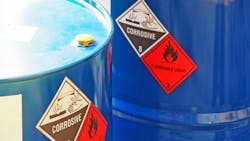The hazard communication system (HCS) regulations are covered in 29CFR1910.1200. Subsection (d) covers “hazard classification.” First, there’s a rule for chemical manufacturers and importers [29CFR1910.1200(d)(1)]. They must determine the hazard class and, where appropriate, the category of each class. Employers who are not manufacturers or importers don’t have to do this, unless for some reason they choose not to rely on the evaluation done by the manufacturer or importer.
What is the takeaway for the company management that is trying to avoid getting cited for HCS violations? Unless you have the expertise to determine the hazard class of a given chemical or can hire a qualified outside expert to make that determination, use what the manufacturer or importer provides.
Secondly, there’s a rule for chemical manufacturers [29CFR1910.1200(d)(2)]. They must identify and consider the full range of scientific literature concerning potential hazards related to that chemical. They are not required to actually perform any testing themselves. However, they must consult Appendix A of 1910.1200 to classify the health hazards and Appendix B of 1910.1200 to identify the physical hazards.
What is the takeaway for the company management that is trying to avoid getting cited for HCS violations? Since there’s no testing requirement and since the “scientific literature” may be sparse if there is any at all, don’t assume all is known about how safe or unsafe a given chemical is. If there’s not much information available about that particular chemical, try to find an equivalent product that doesn’t have these unknowns. For electrical work, this solution is almost always available.
Finally, there are two rules for mixtures. The first one applies to chemical manufacturers, importers, and employers who are evaluating chemicals [29CFR1910.1200(d)(3)(i)]. They must follow the procedures described in Appendices A and B of 1910.1200 to classify the hazards.
What is the take-away for the company management that is trying to avoid getting cited for HCS violations? Have a decision-maker become intimately familiar with Appendices A and B of 1910.1200 and responsible for following those for each chemical your workforce will be using.
The second one applies to chemical manufacturers and importers of mixtures [29CFR1910.1200(d)(3)(ii)]. They can rely on the current safety data sheets of the individual ingredients, except where a certain condition exists. This condition may come as a shock to you, due to what it implies. The exception is the manufacturer or importer knows, or (and this is a legal concept of responsibility wherein feigned or real ignorance is not a valid defense) SHOULD know (in the exercise of reasonable due diligence) that the safety data sheet misstates or omits information required by 1926.1200.
What is the take-away for the company management that is trying to avoid getting cited for HCS violations? Safety data sheets might be wrong, in the sense they understate or fail to state the dangers of a given chemical. Where does this leave you? OSHA doesn’t require you to second guess safety data sheets and product labels. You won’t get an HCS citation due to fraud on the part of those responsible for providing this information. But it does mean you need to be vigilant and apply a reasonable degree of caution.
One fundamental protection measure is to check your sources. If you’re buying contact cleaner from your electrical distributor, there’s a chain of authenticity going back to the brand and there are some other protections. If you decide to “save money” by finding a cheap substitute online, there’s no protection.
Not related to chemicals, but a particular example underscores the importance of buying from reputable sources. During the Great American Eclipse of 2017, inexpensive eclipse glasses were suddenly available all over the Internet. This raised alarm bells at Amazon, which promptly impounded uncertified glasses that did not have a chain of authenticity going back to a qualified manufacturer (other major outlets did the same thing). But people found “bargain glasses” in other places and saved a few bucks. Not long after the eclipse, many of those people were permanently blind. As the Great American Eclipse of 2024 approached, lessons from the tragedy of 2017 were already being applied. For example, many venue hosts supplied real eclipse glasses as part of their registration package.
There’s a lot of fake stuff you can pick up, including fake circuit breakers, fake safety gloves, fake test equipment, and fake solvents. These are often used with tragic results. Your first line of defense is to work with a reputable supplier. Read Subsection (d) and see how much onus is on the supplier. A good distributor makes all the difference, not just in quality, service, and value, but also in safety.
About the Author

Mark Lamendola
Mark is an expert in maintenance management, having racked up an impressive track record during his time working in the field. He also has extensive knowledge of, and practical expertise with, the National Electrical Code (NEC). Through his consulting business, he provides articles and training materials on electrical topics, specializing in making difficult subjects easy to understand and focusing on the practical aspects of electrical work.
Prior to starting his own business, Mark served as the Technical Editor on EC&M for six years, worked three years in nuclear maintenance, six years as a contract project engineer/project manager, three years as a systems engineer, and three years in plant maintenance management.
Mark earned an AAS degree from Rock Valley College, a BSEET from Columbia Pacific University, and an MBA from Lake Erie College. He’s also completed several related certifications over the years and even was formerly licensed as a Master Electrician. He is a Senior Member of the IEEE and past Chairman of the Kansas City Chapters of both the IEEE and the IEEE Computer Society. Mark also served as the program director for, a board member of, and webmaster of, the Midwest Chapter of the 7x24 Exchange. He has also held memberships with the following organizations: NETA, NFPA, International Association of Webmasters, and Institute of Certified Professional Managers.
